Insecurity Forcing Ogun Communities To Use Traditional Safeguards In Combatting Crime
Realising that the Nigeria Police cannot curb crime alone, vigilante groups in a southwest state have stuck to ancient practices of reducing insecurity and seem to be succeeding.
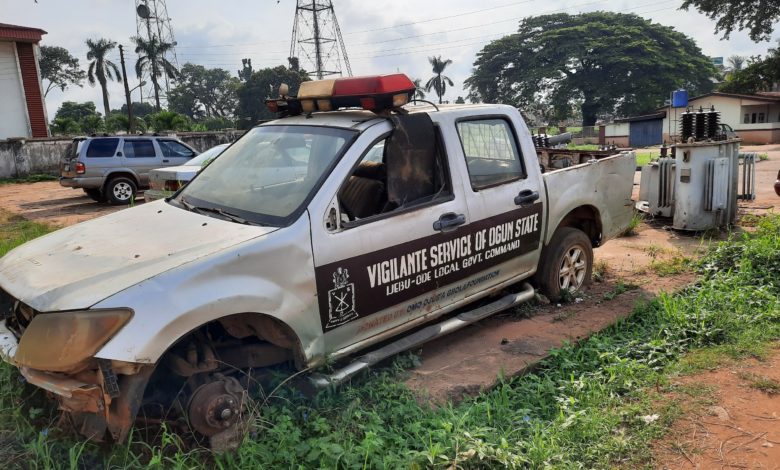
When Olajide finally joined the Supreme Eiye Confraternity as a sophomore at the Olabisi Onabanjo University in Ogun State, it was not because he wanted to stand out. He was rather desperate to blend in.
Membership of the confraternity was a trend where he lived in Ago-Iwoye, Ogun State. It was not only the undergraduate community who identified with these cult groups; artisans and non- professional members of the community also belonged.
Before his arrest by vigilantes in 2015, he had been part of multiple violent operations, including deadly clashes with rival cult groups, and had started to consider himself truly invincible. But as he spent a few nights in the police cell with five other members, reality dawned on him.
Olajide’s gratitude knew no bounds when the police informed him and the others that the charges against them would be dropped on the condition that they would swear to an oath before the traditional ruler and chiefs of Ago-Iwoye that they would never disturb the peace of the community again. After a customary rite of oath-taking, the community also placed a curse on them against returning to their old ways. It worked.
When HumAngle met the Divisional Officer of the town’s Social Orientation and Safety (SO-SAFE) Corps, a vigilante group recognised by the state government, he was full of praises for Ebumawe, the king of Ago-Iwoye, for the initiative.
The first time such oaths were administered was in 2010 and it involved members of Eiye Confraternity and Black Axe (Aiye), the two prominent cult groups in the community.
“There was one boy among them, a very sharpshooter. He normally used two guns and was even known to the commissioner of police at the time,” Olalekan Alatishe narrated.
“There was a day cultists were rioting close to his (Ebumawe) place and I asked why he didn’t intervene. He replied that he had sworn at the palace that he would not hold guns let alone fight anybody,” Alatishe said.
Many of the repentant cultists now work with the police and vigilante groups by providing them information that could help check dangerous plots in the community.
“You see, this our African sense is very good,” declared the SO-SAFE boss, delighted at his accomplishments.
He said if the youth had gone through the criminal justice system and were imprisoned, they might have returned to crime after life in jail.
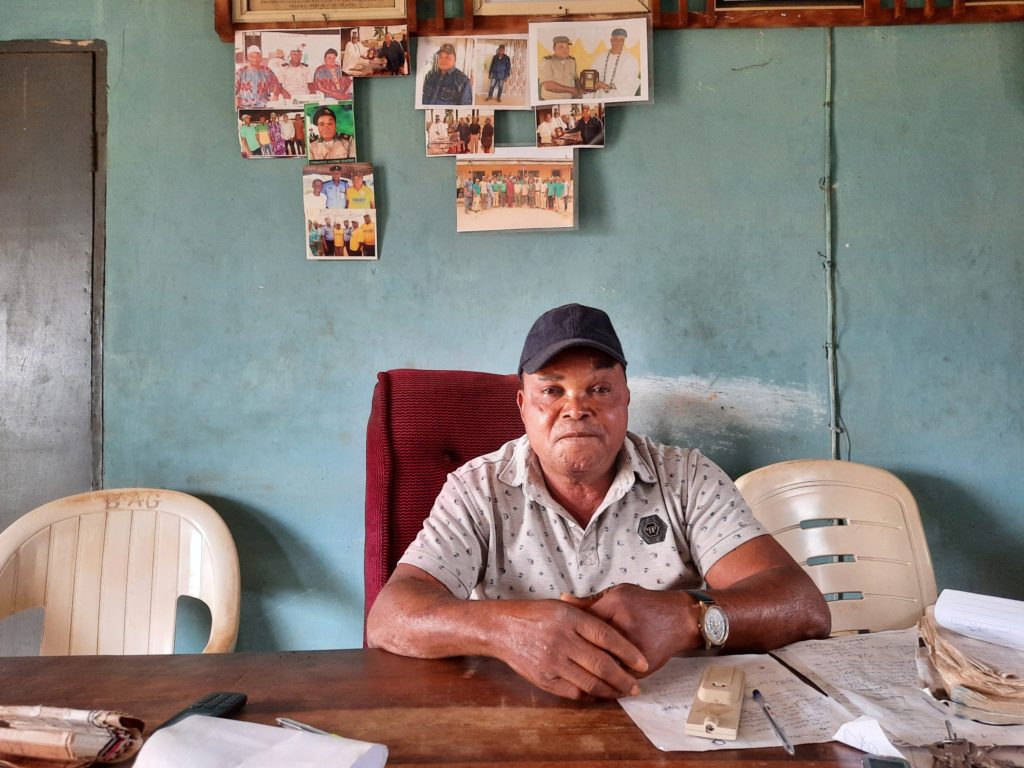
In communities in Southwest Nigeria, it is common to use traditional methods in crime-fighting. The practices include oath-taking, adjudication or alternative dispute resolution, use of herbs to fortify crime fighters, and the invocation of gods and spirits at shrines.
While many of these practices are fading, especially in urban areas due to conventional policing, rural communities still use them.
Osanyin and Ayelala are two of the deities popularly consulted in Yoruba communities for crime control as they are widely believed to reveal the identities of culprits.
A 2016 study by Crawford University in Ogun State indicated that 94 per cent of people interviewed agreed that Ayelala deity was efficient in punishing offenders, while 54 per cent of the respondents wanted the consultation of the deity to be incorporated in the modern justice system.
“In 2005, when Oba Market in Benin City, Edo State went into flames, hoodlums had a field day looting traders’ belongings and breaking into many shops not affected by the fire,” the author, Matthias Olufemi Ojo, wrote.
“However, when the service of the Ayelala deity was employed and the announcement was made that the looters should return the goods they had stolen or face the wrath of Ayelala, the goods earlier carted away resurfaced in the market the following day,” Ojo stated.
In various communities today, the task of fighting insecurity rests partly on the shoulders of vigilante groups such as SO-SAFE and the Vigilante Group of Nigeria (VGN), which work closely with state structures and are increasingly getting government support and recognition.
In the 20th Century, a group called the Banjini operated in Ijebu North Local Government Area. From 1999, an arm of Oodua People’s Congress (OPC), a Yoruba nationalist organisation, started getting involved in crime-fighting amid accusations of brutality and extrajudicial killings. Also in 1999, the Vigilante Group of Nigeria was registered, originating in Benue but quickly spreading to states across the country.
Ayankoya Marcus, Zonal Commander of SO-SAFE in Ijebuland, recalled that a local vigilante group was first formed in the 90s after nine people, including prominent individuals, were killed by robbers during the annual Ojude-Oba festival. The organisation, then called Vigilante Action Group, was led by Thomas Adewale Toye, an engineer. It was later renamed Obanta Safe and Secure Central Vigilante before it became part of VGN.
During the administration of former governor Ibikunle Amosun, in Ogun State, the organisation’s name was again changed to Vigilante Service of Ogun State (VSO). Eventually, a law passed by the House of Assembly in 2017 dissolved VSO and replaced it with SO-SAFE, currently divided into five zones in Ijebu, Egba, Yewa, Remo, and Ota.
Not all VGN members were interested in joining the state organisation. But because of their shared history, the now separated groups occasionally work together. They also collaborate with other security outfits, including the police, military, Nigeria Security and Civil Defence Corps, Department of State Services, Nigeria Immigration Service, Federal Road Safety Corps and National Drug Law Enforcement Agency.
The large network of their members and their familiarity with the nooks and crannies of various communities gives them an advantage in the fight against crime.
In Ogun alone, VGN is estimated to have over 10,000 active members compared to about 7,100 police personnel in the state. Across the country, it claims to have about 200,000 trained members but the leaders say this is not their only advantage.
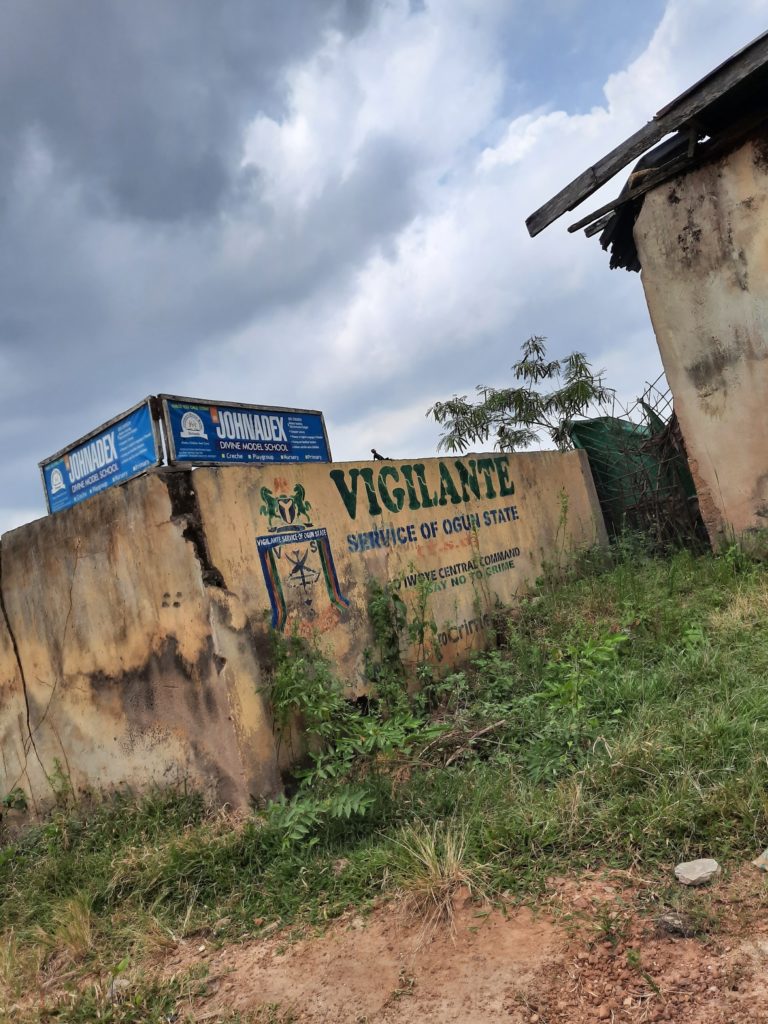
Refuge in charms
While SO-SAFE officials make use of locally made and standard pump-action guns, VGN members are discouraged from using arms unless they are joining forces with the police in an operation. On the other hand, sophisticated weapons are frequently recovered from criminals. To make up for this capacity shortage, most vigilantes turn to traditional means of “fortification”.
Members of some of the vigilante groups told HumAngle that the use of herbs and “natural insurance,” a euphemism for charms, gave them the confidence to go on dangerous field operations that even policemen would hesitate to embark on.
According to Alatishe, the genuine and effective charms can be made with as little as N500 but for them to work, two qualities are required: faith and good character.
He said although criminals used the same materials, they were easily overpowered because they lacked the second trait, good character.
Marcus, who retired as a senior teacher before fully joining the vigilante group, said vigilantes did not work with spiritualists as they had found that “most of them are not truthful” and often act as godfathers to criminals.
Instead, they rely on one another since many of them already have backgrounds deeply rooted in African traditional religion, he said, adding that some were former members of OPC and others local hunters.
Marcus narrated how his men forestalled a bank robbery attempt in 2016. The armoured personnel carrier (APC) stationed close to the banks in Ijebu-Ode was compromised, sabotage designed to incapacitate the police, he said.
“But we came up and engaged the armed robbers. We collected all the arms and ammunition they brought, and we even arrested one and handed him over to the police. That was the end of bank robbery in Ijebu-Ode,” he said.
Marcus said no member of the vigilante group was injured in the operation, adding: “Nobody wants to die in the process of protecting others, so everyone has to fortify themself.
“Even the vehicle we used for the operation was fortified. The armed robbers were surprised when they fired at it and the bullets had no effect.”.
The Deputy Commander of VGN in Ogun State, J.O.M. Olusanya, was the Ijebu-North commander during a similar incident that took place in 2012. When he heard a gang of robbers was approaching after a failed operation in Ibadan, he quickly notified his colleagues in the neighbouring town of Ijebu-Ode. He recalled that the policemen fled for safety after the APC was damaged.
“By the time I got to Ijebu-Ode, I saw one of our officers whose body was covered in white dust because of shots fired at him. There was gunpowder all over him. When the robbers saw that this one was not falling, wouldn’t they run?” he asked as his face lit up.
“Don’t forget that we are all Yoruba. And in Yorubaland in those days, there were wars of supremacy between towns and it was not all the time they used guns. They used some other things. Those things are still there.”
Although he identifies himself as a Christian, Marcus does not see this as an obstacle and hopes people can be more open-minded about traditional safeguards.
“Some believe it is barbaric or that nothing good can come from traditional medicine because they fell into the wrong hands, but there are so many things that the orthodox cannot solve but traditional medicine can help with,” he asserted.
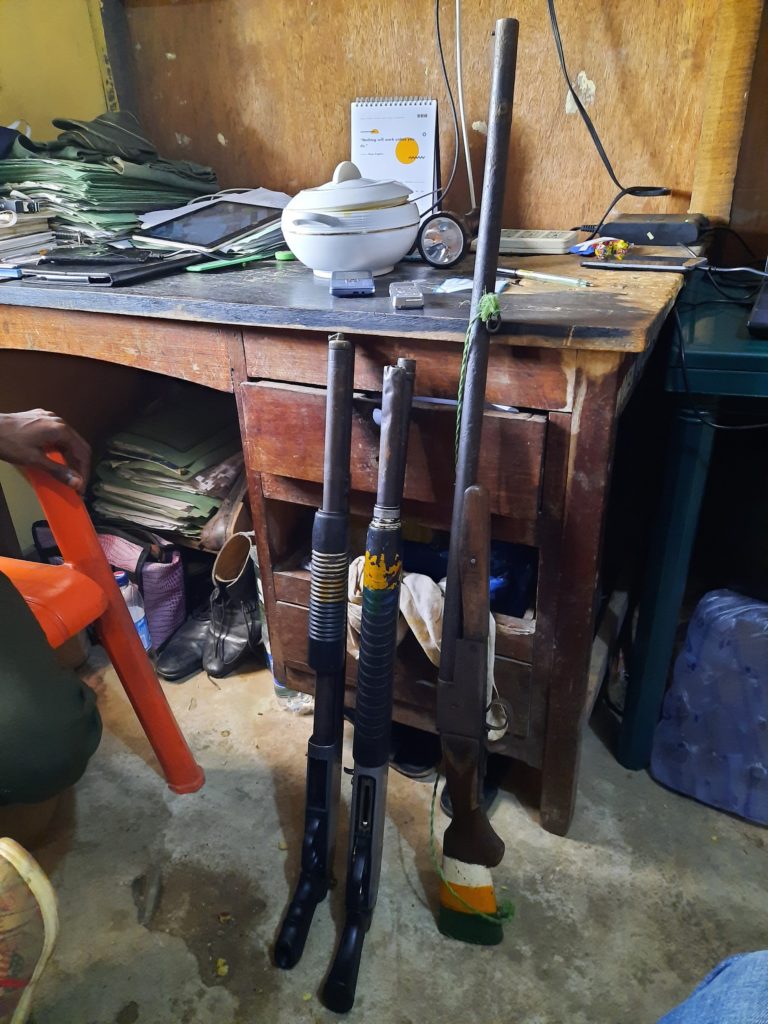
Subscribers say different kinds of charms serve different purposes. They told HumAngle that ayeta prevented bullets from penetrating the body. Àsáàkí on the other hand prevents guns aimed at a person from firing while ìdíjò causes the gun’s cartridge to implode.
Subscribers also said that òwò prevented harm from coming a person’s way in the middle of combat, while ògùn àfèèrí made the user invisible.
Knowledgeable persons say charms worn on the upper arm are called ìfunpá, those tied above the waist are called bànte, while óńdè is worn like a belt. Some charms known as gbééré are incised in the skin and those called àjesára are to be swallowed.
The herbs also have different lifespans with some considered effective only for an operation and others needing to be renewed periodically, HumAngle learnt.
“It works,” replied John Ogundiya with a mix of shock and excitement when he was asked about the charms’ success rates. The resident of Ago-Iwoye, who was a member of bànjínì between 1994 and 1996, said he mostly used òwò because he wanted to avoid being caught up in brutal face-to-face combats.
Buyer beware
While the vigilantes express confidence in their methods and traditional protective kits, there are numerous instances when local charms have been reported to have failed. In one mortifying incident in Oyo State in June, a father shot his 12-year-old son after getting a herbalist to “fortify” him against herders operating in the community.
“I went to this man that I needed a gun charm. He demanded N1,000 but because we are friends I later gave him N500. He gave me the charm and asked me to test it when I got home,” the embarrassed father, Daniel Qudus, narrated. “I then asked my friend, Akinyemi Akinlolu, to help me test the charm on my son. I provided a gun, charm, and other logistics.”
Unlike others in similar situations, his son was lucky to have survived.
In 2018, 27-year-old Aliyu Yahuza died on the spot after he was shot with a Dane gun despite drinking a concoction from a native medicine seller meant to prevent exactly that outcome. That same year, an even more dramatic event took place: a 29-year-old native doctor, Chinaka Adoezuwe, allegedly instructed his client to test the efficacy of a bullet-proof charm he advertised by shooting him. He did not live to complete the transaction.
In a separate incident, an arrested herbalist, who bragged that he had been in the business of providing criminals protective charms, refused to have it tested on him.
The Zonal Administrative Officer for SO-SAFE in Ijebuland, Usamah Kingsley Ige-Adubi, told HumAngle that charms could fail to work if the users did not exercise caution.
“Where you are supposed to advance and you decide not to advance, perhaps because of overconfidence, it has consequences, even with the fortification,” he warned, adding that training in other areas was crucial to the efficacy of charms.
Tricked confessions
Another tactic often employed, with success, by SO-SAFE officials in Ago-Iwoye is the intimidation of criminal suspects using traditional beliefs.
“If there are 10 suspects and no one is willing to confess, I will call a brother who is into Ayelala and say I am bringing some kids to his place,” the Divisional Officer said. “I will then educate them on the effect of Ayelala: you will start swelling and, within seven days, you will die.”
Using this approach, the corps has recovered various stolen items without detaining suspects. “Of course, we were not really planning to take them to that place; nobody wants to die,” he assured.
The group has a shrine dedicated to the worship of Ogun, the Yoruba god of iron, within its office premises and equally uses it to get confessions without physical force. He, however, declined HumAngle’s request to see the shrine.
“One time, a woman came here alleging that her husband wanted to use her for ritual, that he shaved the armpit and private part of the house girl and took it to the ritualist,” he recounted.
“The husband denied the allegation. I told my administrative officer to take them to the Ogun shrine; then she started begging the husband. I insisted they should take them to swear an oath. She then confessed it was a lie. If it were a police station, they would have arrested that man and assumed he was guilty. But we don’t do that here.”
“I don’t believe in taking people to a spiritualist but I believe in intimidation since they produce similar results,” Alatishe added.
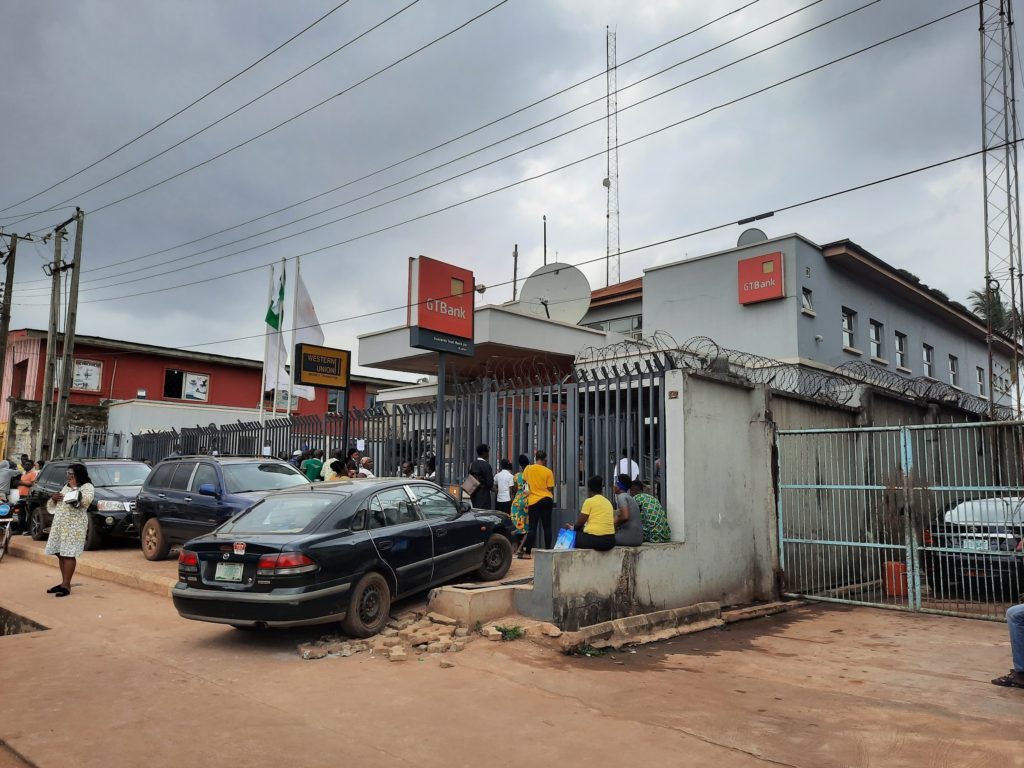
Accolades
Unlike officials of the Nigeria Police Force who are regularly transferred outside familiar environments, members of vigilante groups work in communities where they have lived most of their lives. This makes it easy for them to gain people’s trust and cooperation.
Serifat Kasali, an elderly vendor in Ijebu-Ode, said someone once attempted to dupe her of money meant to construct her shop and she was able to recover the sum with the aid of vigilantes.
“What they are helping with in this community is crucial. They are the ones arresting all those young boys involved in crime,” she said.
“Their work even outweighs that of the police. When a report is made, they act immediately to arrest the suspects. When those cult boys were operating, they were highly active in bringing them to book. They make sure they settle cases referred to them.”
A security guard working with Guaranty Trust Bank, who asked not to be named, confirmed that vigilantes had been actively involved in operations to protect financial institutions in the town.
Ogundiya, however, complained that the vigilante groups existing today were not as fair as the one he was part of in the 90s and accused them of partiality and being prone to abusing their powers.
“In the past, anybody who wanted to be part of the vigilante (group) had to be someone with self-control, conscience and a name to protect. Anyone who would arrest others for doing evil must not be guilty of the same evil. But today, the person we say should protect us are the ones undermining us,” he said.
According to Oludayo Tade, a researcher in criminology and victimology at the University of Ibadan, traditional crime prevention methods should be harnessed because “it is the way of life that people can relate to”.
He, however, said they needed to be regulated by the police to prevent human rights violations.
The Ogun State police spokesperson, Abimbola Oyeyemi, confirmed that the activities of the vigilantes, especially SO-SAFE, were coordinated and under the supervision of the police. He said their officials had to report to the Divisional Police Officer in their jurisdiction before taking any steps.
“We have a series of meetings with them. We are even the ones training them; likewise the Vigilante Group of Nigeria. So, they are being closely monitored and their activities are seriously regulated,” he said on the phone.
“That is why whenever they arrest, before you know it they hand over to the police for investigation and prosecution.”
Oyeyemi further commended vigilantes and local hunters for working with the police to check criminals, especially kidnappers. He said the state was proud to “practise absolute community policing where we involve everybody” and this has yielded a lot of results.
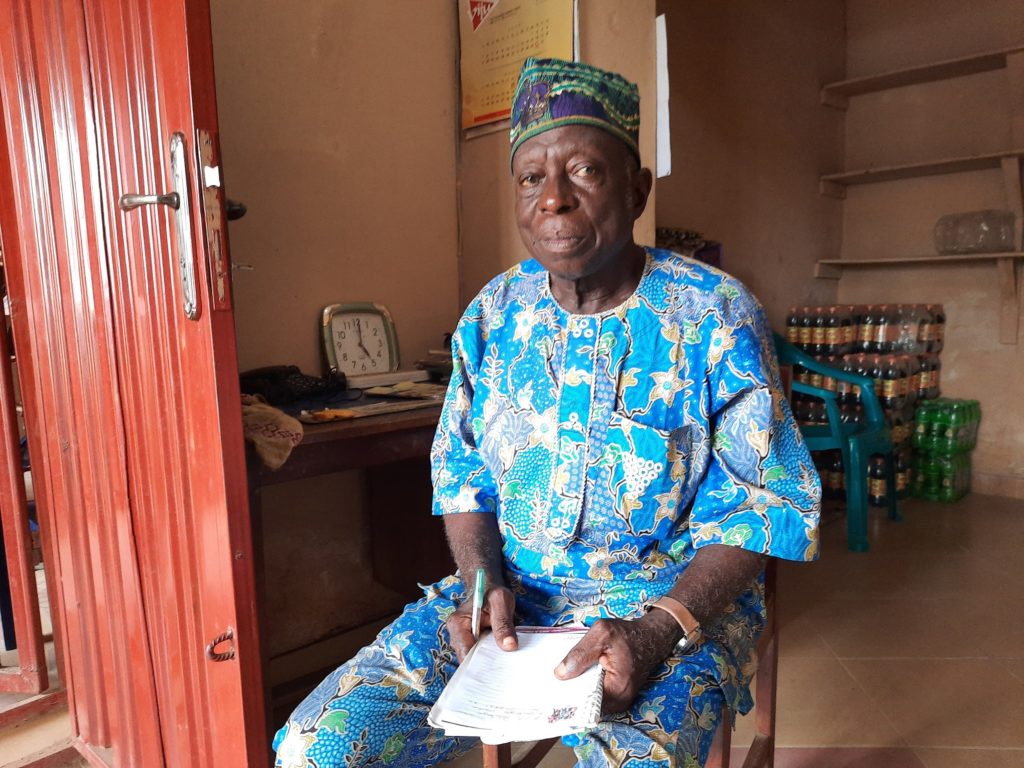
Governments drag feet
As a secondary school student a few years after Nigeria gained independence, Olusanya was an active member of the Boys Scout movement and in 1969 he rose to become an Eagle Scout, the highest rank within the organisation. This gave him an insight into security issues and public service. As a medical laboratory scientist at Olabisi Onabanjo University, he wrote lectures on security and worked with the school’s security outfit. He joined VGN in 2000, a year after the group was established.
When he recently retired from the public service, he had no doubts he would be investing much of his free time in the group’s activities. But Baba JOMO, as he is fondly called, believes the full potential of the vigilante group has not been harnessed.
To make VGN official after nearly two decades of existence, the National Assembly had passed the National Community Policing and Vigilante Protection Corps (Establishment) Bill last year but President Muhammadu Buhari had declined to give his assent.
The bill has been reintroduced at the House of Representatives and is at the committee stage and the assembly says it will find out why the president did not sign the legislation and make necessary adjustments.
Though SO-SAFE has enjoyed the full backing of the law since 2017, its employees have also not received salaries or allowances from the state government.
Marcus thinks the COVID-19 pandemic might have further delayed the process of including staff of the organisation in the state’s wage bill. Support for capital needs and expenses has likewise been inadequate as many branches complain about lacking equipment and patrol vehicles.
“We patrol the community both day and night. You can see two of our patrol vans but they are grounded,” he complained, adding: “We only have one very old van we are managing and two motorcycles.”
Abidoye Bamidele, a resident of Ijebu-Ode, believes vigilante groups are in the best position to tackle certain security challenges such as cultism and urged the government to assist them.
“The vehicle used by VGN is one of the oldest you can find around. How many cars can that chase?” he asked. “They are good people; they need to be given equipment. Without that, they cannot do anything.”
Because of the lack of incentives, majority of the groups’ members have become passive as they look elsewhere for sustenance.
“We have almost 75 members in Ago-Iwoye but only about 12 are functioning.
“There are those who just identify as members, but they don’t come to the office and it is because we have not been receiving salaries. I cannot just ask them to come here every day without providing their daily bread. They have families. They want to function but they also need to fend for themselves,” Alatishe said.
For now, members tax themselves and depend on donations from the community to keep their operations going. Some are also outsourced to provide security services to corporate organisations as a source of income for sustenance.
“The Yoruba say unfulfilled hope makes the heart unwell,” Baba JOMO said. “The morale has dropped and we don’t blame those who are still feeling reluctant. Work is in progress in Abuja and we continue to encourage everybody to keep hope alive.”
Support Our Journalism
There are millions of ordinary people affected by conflict in Africa whose stories are missing in the mainstream media. HumAngle is determined to tell those challenging and under-reported stories, hoping that the people impacted by these conflicts will find the safety and security they deserve.
To ensure that we continue to provide public service coverage, we have a small favour to ask you. We want you to be part of our journalistic endeavour by contributing a token to us.
Your donation will further promote a robust, free, and independent media.
Donate Here





